Maven
Get verified solutions from MAVEN, here you get verified academic materials with updated solutions in various academic fields experience . and you will find everything you need in NURSING EXAMS AND TESTBANKS.REACH US OUT, to fetch it for you in minutes if we do not have it in this shop.!!!!Always leave a review after purchasing any document so as to make sure our customers are 100% satisfied.
- 478
- 0
- 0
Community
- Followers
- Following
478 items
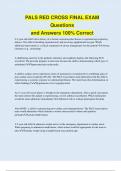
PALS RED CROSS FINAL EXAM Questions and Answers 100% Correct
A 5-year-old child with a history of a chronic neuromuscular disease is experiencing respiratory distress. The child is breathing spontaneously and receiving supplemental oxygen. Which additional intervention is a critical component of airway management for this patient?Airway clearance (e.g., suctioning) A child being cared for in the pediatric telemetry unit suddenly displays the following ECG waveform. The provider prepares to intervene because the child is demonstrating which type o...
- Exam (elaborations)
- • 8 pages •
A 5-year-old child with a history of a chronic neuromuscular disease is experiencing respiratory distress. The child is breathing spontaneously and receiving supplemental oxygen. Which additional intervention is a critical component of airway management for this patient?Airway clearance (e.g., suctioning) A child being cared for in the pediatric telemetry unit suddenly displays the following ECG waveform. The provider prepares to intervene because the child is demonstrating which type o...
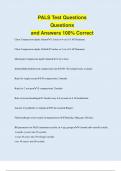
PALS Test Questions Questions and Answers 100% Correct
Chest Compression depth: Infant1.5 inch or 4 cm (1/3 AP Diameter) Chest Compression depth: Child2 inches or 5 cm (1/3 AP Diameter) Maximum Compression depth: Infant2.4 in or 6cm Infant/children/adolescent compression rate100-120 compressions a minute Ratio for single rescuer30 compressions 2 breaths Ratio for 2 rescuer15 compressions 2 breaths Rate of rescue breathing1 breath every 6-8 seconds or 8-10 breaths/min Isotonic Crystalloids 2 examplesNS & Lactated Ringers Fluid challenge is ho...
- Exam (elaborations)
- • 3 pages •
Chest Compression depth: Infant1.5 inch or 4 cm (1/3 AP Diameter) Chest Compression depth: Child2 inches or 5 cm (1/3 AP Diameter) Maximum Compression depth: Infant2.4 in or 6cm Infant/children/adolescent compression rate100-120 compressions a minute Ratio for single rescuer30 compressions 2 breaths Ratio for 2 rescuer15 compressions 2 breaths Rate of rescue breathing1 breath every 6-8 seconds or 8-10 breaths/min Isotonic Crystalloids 2 examplesNS & Lactated Ringers Fluid challenge is ho...
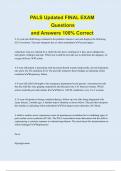
PALS Updated FINAL EXAM Questions and Answers 100% Correct
A 12-year-old child being evaluated in the pediatric intensive care unit displays the following ECG waveform. The team interprets this as which arrhythmia?second degree Laboratory tests are ordered for a child who has been vomiting for 3 days and is diaphoretic, tachypneic, lethargic and pale. Which test would the provider use to determine the adequacy of oxygen delivery?Lactate A 9-year-old patient is presenting with decreased breath sounds, bradycardia, slowed respiratory rate and a ...
- Exam (elaborations)
- • 8 pages •
A 12-year-old child being evaluated in the pediatric intensive care unit displays the following ECG waveform. The team interprets this as which arrhythmia?second degree Laboratory tests are ordered for a child who has been vomiting for 3 days and is diaphoretic, tachypneic, lethargic and pale. Which test would the provider use to determine the adequacy of oxygen delivery?Lactate A 9-year-old patient is presenting with decreased breath sounds, bradycardia, slowed respiratory rate and a ...
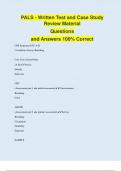
PALS - Written Test and Case Study Review Material Questions and Answers 100% Correct
CPR SequenceC-A-B Circulation-Airway-Breathing Core Case Action Order (A,I,I)Assess Identify Intervene CBC (Assessment part 1 aka initial assessment)Consciousness Breathing Color ABCDE (Assessment part 2 aka primary assessment)Airway Breathing Circulation Disability Exposure SAMPLE
- Exam (elaborations)
- • 13 pages •
CPR SequenceC-A-B Circulation-Airway-Breathing Core Case Action Order (A,I,I)Assess Identify Intervene CBC (Assessment part 1 aka initial assessment)Consciousness Breathing Color ABCDE (Assessment part 2 aka primary assessment)Airway Breathing Circulation Disability Exposure SAMPLE
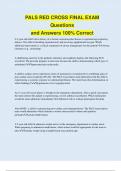
PALS RED CROSS FINAL EXAM Questions and Answers 100% Correct
A 5-year-old child with a history of a chronic neuromuscular disease is experiencing respiratory distress. The child is breathing spontaneously and receiving supplemental oxygen. Which additional intervention is a critical component of airway management for this patient?Airway clearance (e.g., suctioning) A child being cared for in the pediatric telemetry unit suddenly displays the following ECG waveform. The provider prepares to intervene because the child is demonstrating which type o...
- Exam (elaborations)
- • 8 pages •
A 5-year-old child with a history of a chronic neuromuscular disease is experiencing respiratory distress. The child is breathing spontaneously and receiving supplemental oxygen. Which additional intervention is a critical component of airway management for this patient?Airway clearance (e.g., suctioning) A child being cared for in the pediatric telemetry unit suddenly displays the following ECG waveform. The provider prepares to intervene because the child is demonstrating which type o...
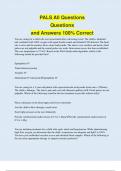
PALS All Questions Questions and Answers 100% Correct
You are caring for a child who was resuscitated after a drowning event. The child is intubated and ventilated with 100% oxygen with equal breath sounds and exhaled CO2 detected. The heart rate is slow and the monitor shows sinus bradycardia. The skin is cool, mottled, and moist; distal pulses are not palpable and the central pulses are weak. Intravenous access has been established. The core temperature is 37.3oC. Based on the PALS bradycardia algorithm, which of the following should be...
- Exam (elaborations)
- • 16 pages •
You are caring for a child who was resuscitated after a drowning event. The child is intubated and ventilated with 100% oxygen with equal breath sounds and exhaled CO2 detected. The heart rate is slow and the monitor shows sinus bradycardia. The skin is cool, mottled, and moist; distal pulses are not palpable and the central pulses are weak. Intravenous access has been established. The core temperature is 37.3oC. Based on the PALS bradycardia algorithm, which of the following should be...
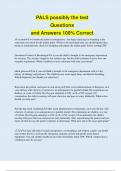
PALS possibly the test Questions and Answers 100% Correct
10 secondsA 6 month old infant is unresponsive. You begin checking for breathing at the same time you check for the infants pulse. Which is the maximum time you should spend when trying to simultaneously check for breathing and palpate the infants pulse before starting CPR? Disordered Control of BreathingA 4 year old child is brought to the emergency department for seizures. The seizures stopped a few minutes ago, but the child continues to have slow and irregular respirations. Which co...
- Exam (elaborations)
- • 8 pages •
10 secondsA 6 month old infant is unresponsive. You begin checking for breathing at the same time you check for the infants pulse. Which is the maximum time you should spend when trying to simultaneously check for breathing and palpate the infants pulse before starting CPR? Disordered Control of BreathingA 4 year old child is brought to the emergency department for seizures. The seizures stopped a few minutes ago, but the child continues to have slow and irregular respirations. Which co...

PALS Updated FINAL EXAM Questions and Answers 100% Correct
A 12-year-old child being evaluated in the pediatric intensive care unit displays the following ECG waveform. The team interprets this as which arrhythmia?second degree Laboratory tests are ordered for a child who has been vomiting for 3 days and is diaphoretic, tachypneic, lethargic and pale. Which test would the provider use to determine the adequacy of oxygen delivery?Lactate A 9-year-old patient is presenting with decreased breath sounds, bradycardia, slowed respiratory rate and a ...
- Exam (elaborations)
- • 8 pages •
A 12-year-old child being evaluated in the pediatric intensive care unit displays the following ECG waveform. The team interprets this as which arrhythmia?second degree Laboratory tests are ordered for a child who has been vomiting for 3 days and is diaphoretic, tachypneic, lethargic and pale. Which test would the provider use to determine the adequacy of oxygen delivery?Lactate A 9-year-old patient is presenting with decreased breath sounds, bradycardia, slowed respiratory rate and a ...
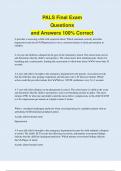
PALS Final Exam Questions and Answers 100% Correct
A provider is assessing a child with suspected shock. Which statement correctly describes hypotension and shock?Hypotension is not a consistent feature of shock presentation in children. A 10-year-old child has collapsed in the gym of the elementary school. The school nurse arrives and determines that the child is unresponsive. The school nurse then simultaneously checks for breathing and a central pulse, limiting this assessment to which time frame?No more than 10 seconds A 4-year-o...
- Exam (elaborations)
- • 8 pages •
A provider is assessing a child with suspected shock. Which statement correctly describes hypotension and shock?Hypotension is not a consistent feature of shock presentation in children. A 10-year-old child has collapsed in the gym of the elementary school. The school nurse arrives and determines that the child is unresponsive. The school nurse then simultaneously checks for breathing and a central pulse, limiting this assessment to which time frame?No more than 10 seconds A 4-year-o...
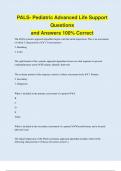
PALS- Pediatric Advanced Life Support Questions and Answers 100% Correct
The PALS systemic approach algorithm begins with the initial impression. This is an assessment of which 3 characteristics?1. Consciousness 2. Breathing 3. Color The right branch of the systemic approach algorithm focuses on what sequence to prevent cardiopulmonary arrest?Evaluate, Identify, Intervene The evaluate portion of the sequence consists of three assessment tools:1. Primary 2. Secondary 3. Diagnostic What is included in the primary assessment of a patient?A B C D E Vital...
- Exam (elaborations)
- • 14 pages •
The PALS systemic approach algorithm begins with the initial impression. This is an assessment of which 3 characteristics?1. Consciousness 2. Breathing 3. Color The right branch of the systemic approach algorithm focuses on what sequence to prevent cardiopulmonary arrest?Evaluate, Identify, Intervene The evaluate portion of the sequence consists of three assessment tools:1. Primary 2. Secondary 3. Diagnostic What is included in the primary assessment of a patient?A B C D E Vital...
